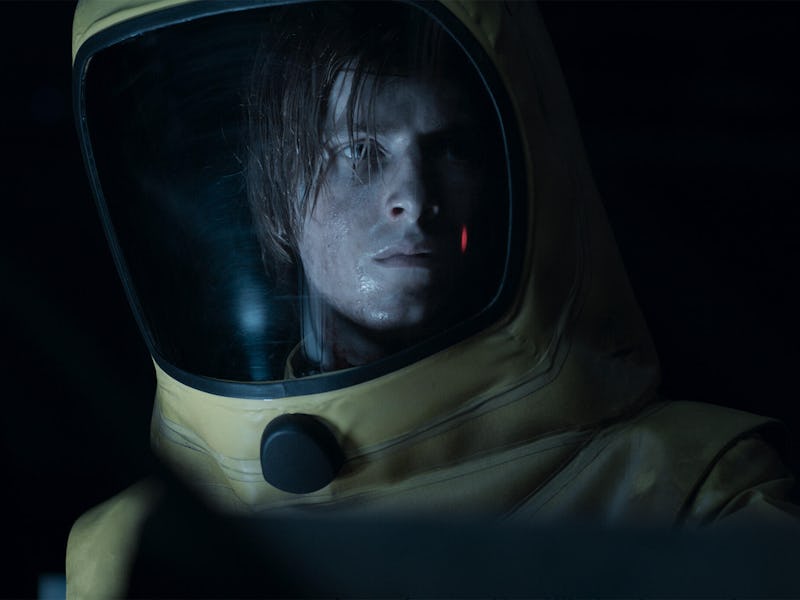You need to watch the most inventive time-travel thriller of the century on Netflix ASAP
“What we know is a drop. What we don’t know is an ocean.”

What is it about time travel that’s so enthralling?
The pop culture staple first became popularized by H.G. Wells’ 1895 novel The Time Machine, but time travel as a concept has been toyed with in literature as far back as ancient Hindu and Japanese mythology. One of the oldest “true” time travel accounts comes from a first-century B.C. Jewish scholar, Honi HaMe’agel, who was certain he fell asleep and woke up 70 years in the future.
Humans are fascinated with not only the ability, but its aftermath. How can one tweak in the timeline affect the rest of history? Countless creations have taken a stab at interpreting this question — 12 Monkeys, 11.22.63, Paper Girls, Doctor Who, and 13 Going on 30, to name just a few disparate examples — and all offer different answers. For some, messing with the timeline is perilous. Others feel victorious, and yet more characters come to the bitter realization that nothing can be done to change fate.
But we’re hard-pressed to find a better exploration of how time travel can affect the lives of ordinary people than Dark.
Dark debuted on Dec. 1, 2017 and ran for three seasons, becoming Netflix’s first bonafide non-English hit (and setting the stage for Squid Game in the process). The German-language barrier initially made it an obscure title, but word-of-mouth created hype until it became a must-watch for sci-fi fans. The duo behind the genre-bender, Baran bo Odar and Jantje Friese, are releasing a mystery-at-sea dubbed 1899 on Nov. 17, so now’s the perfect time to familiarize yourself with their work.
“Have you heard of Master Zhuang’s paradox?” grandmother Ines Kahnwald asks. “‘I dreamed I was a butterfly. Now I’ve woken up and I no longer know if I’m a person who dreamed he’s a butterfly or if I’m a butterfly who’s dreaming it’s a person.’”
Dark is obsessed with unraveling the Chinese philosopher’s paradox and the existential implications of time. All of its characters, at one point or another, no longer know where (or when) they start and where or when they end. That may leave you just as perplexed as the residents of Winden, the town where Dark takes place, but we promise that the rewards for keeping up will be worthwhile.
Dark spans various timelines and generations, but always takes place in the fictional town of Winden.
The relationships between four estranged families are untangled and retangled, as characters realize their bloodlines are more intertwined than they first thought. It all begins with modern teen Jonas Kahnwald (Louis Hoffman), who’s just lost his father to suicide and the love of his life to his best friend. Jonas’ life gets even worse when neighborhood boy Mikkel Nielsen (Daan Lennard Liebrenz) disappears into a wormhole and winds up in 1986.
Any further details would detract from the juicy mysteries, especially since part of the fun comes from trying to wrap your head around the confounding time jumps. They span from the 1880s to the 2050s, and you’ll quickly become engrossed in the detective work that Jonas and his friends tackle.
Everything and everyone is connected.
Dark also shines in its production values — the moody and rainy cinematography is gorgeous, Ben Frost’s score is chillingly beautiful, and the period piece costuming and set design is immersive — and in its casting. We have Simone Bär to thank for finding strikingly accurate doppelgängers of all of Dark’s characters, which makes the family drama aspect one of the show’s most believable.
This colossal ensemble cast was tasked with portraying four generations’ worth of characters, most of whom required a child, teenage, adult, and senior actor. It’s delightful to look at the painstaking lengths both the casting and makeup departments went to ensure characters had features that made them aesthetically unique — birthmarks, freckles, bushy eyebrows, glasses — and enhance visual and thematic continuity.
A young and older Jonas show off Dark’s impeccable casting.
Dark is also better than most modern mystery series because it had the chance to conclude on the creator’s terms, a rarity in a saturated streaming landscape eager to discard projects before people have an opportunity to press play. Pacing remained consistent throughout Dark’s run, and it had a satisfying ending that actually made sense of its spider web narrative while tying up loose ends.
Your heart might break at the end of Dark, but not because its central riddle is left unsolved. It’s a heavy lift, but it’s great to have the increasingly rare opportunity to see a show through from start to finish.
Dark is streaming on Netflix.